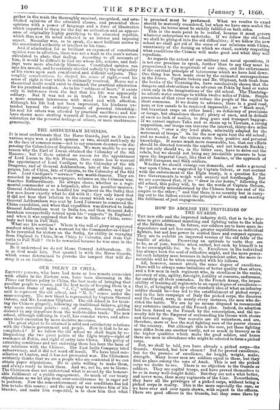OUR POLICY IN CHINA.
EMINENT persons, who have had more or less remote connexion with affairs in the Eastern seas, have been discussing in the Times our future policy in China, the best mode of bringing that peculiar people to reason, and the best mode of keeping them in a wholesome frame of mind. "J. C.," without offence, may be said to represent the old school, and "M. N." comes under the same category. The new blood is represented by Captain Sh.erard Osborn, and Mr. Laurence Oliphant. The old school is for treat- ing the Chinese gingerly, following up traditional failures, giving way upon essential points ; and, of course, foreseeing endless disaster in any departure from the well-trodden track: The new school, although differing in itself, has sounder views, and advo- eates their execution by more decisive measures.
The great object to be attained is solid and satisfactory relations with the Chinese government and people. How is that to be ac- complished? If we follow the old wheel we shall begin by re- linquishing the two great points of the Elgin treaty—right of residence at Pekin, and right of entry into China. This policy of extorting conditions and not enforcing them has been the bane of our relations with the Chinese. The East India Company tried subserviency, and it did not ward off insult. We have tried con- ciliation at Canton, and it has not prevented war. The Chinaman evidently thinks that we are a people who are contented if we can obtain paper stipulations. He is quite willing to make them, and always ready to break them. And we, not he, are to blame. The Chinaman does not understand what is meant by the honour- able fulfilment of a public engagement. So much of our treaty stipulations as we let slip from over-sensitiveness he is eager not to perform. Now the non-enforcement of our conditions has led him to take this course ; and the only way to convince him of his blunder, and make him respectful, is to show him that what is promised must be performed. What we resolve to exact should be maturely considered, but when we have once sealed the bargain, its terms must be strictly fulfilled on both sides. This is the main point to be settled, because it must govern whatever enterprises we undertake. If we follow the old school we shall be plunged into the old difficulties ; if we follow the new school we shall get rid of the curse of our relations with China, uncertainty of the footing on which we stand, anxiety respecting what conditions the Chinese will make good and what they will repudiate.
As regards the extent of our military and naval operations, it is not our province to speak, further than to say they must be proportioned to the magnitude of our aims, and the enforcement of the cardinal principle of intercourse which we have laid down. One thing has been made clear by the animated correspondence in the Times. Captain Osborn and Mr. Oliphant, both fresh from the banks of the lientsing-ho, have conclusively shown that the dangers and obstructions to an advance on Pekin by land or water exist only in the imaginations of the old school. The Tientsing- ho affords water carriage to within twelve miles of Pekin. Simple possession of that river would reduce the people of the capital to short commons. If we desire to advance, there is a good road, none or few canals to be rendered impassable ; no "black mud," but luxuriant crops on either hand ; no deficiency of provisions or forage, but abundance thereof; plenty of oxen, and in default of oxen no lack of coolies, to drag guns and transport baggage. If we cannot capture Taku and so steam up to Tientsin, a strong supposition, our troops can traverse the interval, thirty-five miles in extent, "over a dry level plain, admirably adapted for the movement of troops." So far the new again beat the old school ; and no wonder, for the victors write from positive and personal knowledge. It seems much more reasonable, too, that our efforts should be directed towards the capital, and not towards Nankin; for not only should we, in the latter case, have to drive out the rebels, but we should not bring any irresistible pressure to bear upon the Imperial Court, like that of famime, or the approach of 20,000 European and Sikh soldiers. Whether we should enlarge our demands, and make a general war upon China, as suggested by Captain Osborn, or rest content with the enforcement of the Elgin treaty, is a question for the two Governments to weigh with anxiety and forethought. But we are convinced that, if we " draw in our horns," following the old school, this policy will, to use the words of Captain Osborn, be "perfectly misunderstood by the Chinese from one end of the empire to the other ; " and that there is no security but in carry- ing out to the fullest extent the principle of making and exacting the fulfilment of just engagements.


























 Previous page
Previous page